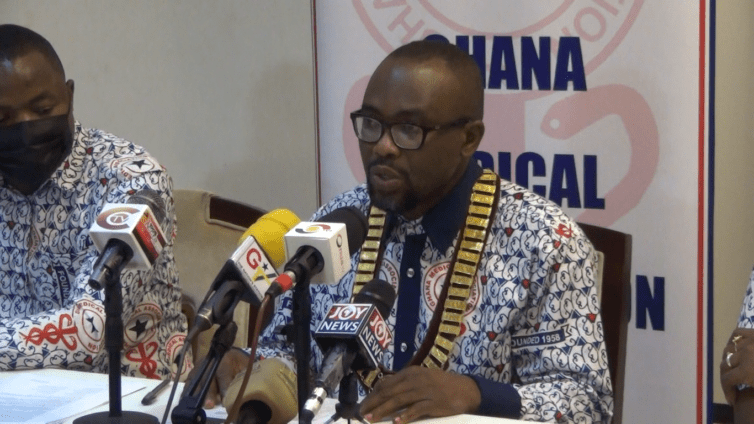Dr. Vishnu Nene Limon Abayateye, a member of the Ghana Medical Association (GMA), has taken significant steps to challenge the authority of the association’s president, Dr. Frank Serebour. Abayateye has officially submitted a petition calling for Dr. Serebour’s removal, catalyzed by a recent directive from Serebour urging GMA members to continue their work, despite a nationwide strike organized by Labour against illegal mining activities, commonly referred to as galamsey. The strike is scheduled to commence on October 10, 2024, and Abayateye views Serebour’s position as not only contrary to the GMA’s constitution but also damaging to the public image of the association. The petition was directed to the GMA’s National Executive Council (NEC) and its General Secretary, and it arrives just ahead of the GMA’s Annual General Meeting (AGM), which is set for November 3-10, 2024, in Ho.
In the petition, Abayateye articulates that Dr. Serebour has breached Article 16 of the GMA constitution. He asserts that Serebour’s directive undermines the unity that the GMA has previously shown in solidarity with Organised Labour’s fight against illegal mining. Abayateye’s concerns extend beyond internal governance as he argues that the president’s instructions have put the association in a negative light, leading to an image of duplicity in public perception. He contends that Serebour’s stance is incongruent with the GMA’s previous positions regarding illegal mining, which could confuse the public and damage the credibility of the association. Abayateye emphasizes that as a respected medical association, maintaining a consistent and clear stance on pressing issues like illegal mining is crucial for professional integrity and social responsibility.
In the petition, Abayateye has expressed his determination to gather enough support from the GMA’s General Assembly to pass a motion for Dr. Serebour’s removal. He cited the need for a two-thirds majority within the General Assembly to carry the motion and has committed to mobilizing his fellow members in this pursuit. His assertive call to action reflects a sense of urgency and the serious implications that Serebour’s directive has for the GMA as an organization. Abayateye insists that the legitimacy of the GMA rests upon its ability to align its internal governance and public communication with its foundational principles, which fundamentally focus on the health and welfare of the citizenry.
Dr. Serebour’s directive, which has sparked the controversy, was communicated to the GMA members on October 8, 2024. In this message, he clarified that the association had not officially declared an industrial action, despite standing in solidarity with Organised Labour in their campaign against galamsey. He instructed members to maintain their responsibilities and provide uninterrupted medical services during the strike. Serebour’s emphasis on the association’s non-participation in industrial action has been framed as a directive aimed at ensuring that healthcare services remain available and that the public health system does not suffer due to the strikes.
Serebour’s statement, while intended to uphold the association’s commitment to public health, has been perceived by some members as conflicting with the GMA’s previously expressed solidarity with anti-galamsey efforts. This divergence in perspectives raises critical questions about the GMA’s role as both a professional body and a participant in public advocacy. For many, the primary concern is that the GMA should be actively engaged in issues affecting public health, including the detrimental effects of illegal mining. Abayateye’s petition, therefore, is not only a call for new leadership but also a broader commentary on the GMA’s responsibilities and ethical obligations to advocate for national and public health initiatives.
The unfolding events surrounding Dr. Abayateye’s petition and Dr. Serebour’s directive demonstrate the complexities within medical associations, especially in contexts where public and professional responsibilities intersect. The situation underscores the delicate balance between fulfilling healthcare obligations and participating in broader socio-political movements. As the GMA prepares for its upcoming AGM, the discussions and decisions made regarding this petition will likely shape the future trajectory of the association’s involvement in advocacy and its internal democratic processes. The outcome may have significant implications not only for the GMA’s leadership but also for the association’s legitimacy and public image in addressing pressing national issues such as illegal mining. Ultimately, how this internal strife is resolved could influence the GMA’s position in future engagements with both its members and the public regarding critical health and socio-environmental issues.


